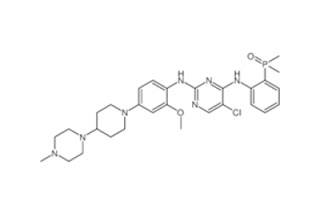Brigatinib is a type of drug that is used to treat
patients with non-small cell lung cancer (NSCLC). This drug belongs to a class
of drugs called tyrosine kinase inhibitors, which work by blocking the activity
of certain enzymes that are involved in the growth and spread of cancer
cells. Brigatinib Intermediate has shown promising results in clinical trials and is
considered a second-line treatment option for patients who have failed
first-line therapy with crizotinib.
NSCLC is the most common type of lung cancer and
accounts for approximately 85% of all lung cancer cases. The disease is
typically diagnosed in advanced stages and can be difficult to treat, making
the development of effective treatment options a priority for the medical
community.
Brigatinib China works
by targeting the ALK gene, which is often found to be mutated in patients with
NSCLC. This mutation leads to the production of an abnormal protein that
promotes the growth and spread of cancer cells.
By blocking the activity of this protein, brigatinib can slow the growth and
spread of cancer cells and improve patient outcomes.
One of the key benefits of brigatinib is its ability to
penetrate the blood-brain barrier, making it an effective treatment option for
patients with brain metastases. This is particularly important because brain
metastases are a common complication of NSCLC and can be difficult to treat
with other medications.
The most common side effects associated with brigatinib
include fatigue, nausea, diarrhea, and headache. More serious side effects,
such as low white blood cell count and increased risk of infections, have also
been reported in some patients. However, these side effects are generally
manageable with appropriate medical attention and close monitoring by a
healthcare provider.
In conclusion, Brigatinib Intermediate is an important treatment option for patients with non-small cell lung cancer who have failed first-line therapy with crizotinib. The drug has shown promising results in clinical trials and has the potential to improve patient outcomes by targeting the ALK gene and blocking the activity of the abnormal protein produced by this gene. Although there are some potential side effects associated with brigatinib, these are generally manageable with close monitoring and appropriate medical attention.
Follow us on Twitter


No comments:
Post a Comment